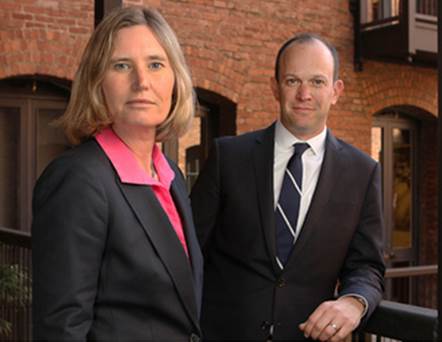
Keker & Van Nest Partners Rachael Meny and Jamie Slaughter
Jeffry Levin lives in the small Northern California town of Pinole and works as a courier at Try Caviar Inc., a company at which customers use a mobile phone application to get food delivered from restaurants.
Levin sued Try Caviar two weeks ago, claiming the San Francisco-based business mislabeled him an independent contractor when he should be an employee. The classification keeps Levin from enjoying protection under California labor laws and has practical effects like forcing him to pay for the fuel needed to make deliveries. Levin v. Try Caviar Inc., CV151285 (N.D. Cal., filed March 19, 2015).
The courier's putative class action was filed the same day as two other misclassification lawsuits against two other San Francisco companies courier service Postmate Inc. and cleaning operation Homejoy Inc. The timing was not coincidental. Ridesharing apps Uber Inc. and Lyft Inc. had one week prior been denied summary judgment in misclassification suits filed against them.
Shannon LissRiordan, a Boston-based attorney and the plaintiffs' lawyer in all five of these cases, said "we were getting a lot of calls" after the Uber and Lyft rulings and that more suits could be on deck. San Francisco plaintiff attorney Matthew D. Carlson is also representing workers in the cases.
With class certification in the Uber and Lyft cases perhaps the next litmus test for these suits' viability, the lawsuits could upend the employment models of so-called sharing economy companies businesses that characterize themselves as tech companies merely facilitating transactions between worker and customer through phone apps and websites.
According to Julie M. Capell, an employment defense lawyer at Winston & Strawn LLP not involved in the suits, some companies have become more wary of how they classify workers after the Uber and Lyft rulings questioned the idea that the sharing economy doesn't fit within a traditional employer employee framework.
Michael A. Troncoso, chief campus counsel at UC Santa Cruz who has been closely tracking these cases, said if class certification is granted, Uber, Lyft and others might "change their business model or go to the state Legislature for clarification" in order to eliminate the uncertainty like further monetary and publicity damages that could come from a jury trial.
The decisions, meanwhile, could be a boon to plaintiffs' lawyers in both opening up litigation against a new sector of the economy and raising the bar for what misclassification suits can be killed at the summary judgment stage. "From the plaintiff side perspective, these decisions were extremely helpful and important," said Scott R. Ames, a plaintiffs' attorney whose focus includes misclassification matters.
In the Uber and Lyft cases and three follow on suits, plaintiffs argue that despite possessing some characteristics generally associated with contractors hired by companies, such as the ability to work when they want or do labor for a direct competitor, these workers are ultimately employees.
That is mainly because the companies exert a significant level of control over their work activities, including the right to hire and fire them, the ability to set their compensation rates, and also handbooks that dictate workplace behavior.
In the Uber decision, U.S. District Judge Edward M. Chen said that company's software method for connecting drivers and passengers makes it no more of a technology company "than Yellow Cab is a technology company because it uses CB radios to dispatch taxi cabs," concluding, "Very few (if any) firms are not technology companies if one focuses solely on how they create or distribute their products." O'Connor v. Uber Technologies Inc., CV133826 (N.D. Cal., filed Aug. 16, 2013).
And in a ruling against Lyft, U.S. District Judge Vince G. Chhabria concluded that the notion that Lyft is merely a facilitator between seller and buyer is "obviously wrong" and not a "serious" argument. Cotter v. Lyft Inc., CV1304065 (N.D. Cal., filed Sept. 3, 2013).
Chhabria said that the most important question in a misclassification suit is the level of control employers have over their workers. The judge found that Lyft exerted control over drivers who use the Lyft app from the ability to fire them to workplace details like forcing them to put giant pink moustaches on their car's hoods. Chhabria wrote that a reasonable jury could conclude the drivers were misclassified.
Lyft and Uber are now preparing a class certification battle. Lyft has since hired Keker & Van Nest LLP attorneys Rachael E. Meny and R. James Slaughter to bolster a legal team that also includes Alex Santana at Ogletree, Deakins, Nash, Smoak & Stewart P.C. Robert Jon Hendricks, a partner at Morgan, Lewis & Bockius LLP, represents Uber.
Both Keker lawyers declined to comment on the record about the case, but in a filing last week, Lyft claimed class certification will be difficult because plaintiffs are an "incredibly diverse" group with wildly varied work schedules. The argument partly borrows from Chhabria's ruling that drivers working 50 hours a week look similar to employees, while those scheduling work around other activities seem like independent contractors.
Employment lawyers, though, are skeptical about Lyft's preliminary argument.
Cappell said it will be an "uphill battle" for the company because all these workers are under Lyft's business model, which means they are subject to the same controls regardless of their hours. "A court may see the ability for drivers to choose different schedules as simply relevant to the overall legal inquiry, and not fatal to class certification."
Meanwhile, Try Caviar, Homejoy and Postmate are preparing to see how describing themselves as technology companies fares as a defense. Postmate, for example, bills itself as a "revolutionary urban logistics and ondemand delivery platform that connects customers with local couriers" on its website.
Defendant companies did not return messages or declined comment.
The Postmates suit is Singer v. Postmates Inc., CV151284 (N.D. Cal., filed March 19, 2015) and the Homejoy case is Iglesias v. Homejoy Inc. CV151286 (N.D. Cal.,filed March 19, 2015).